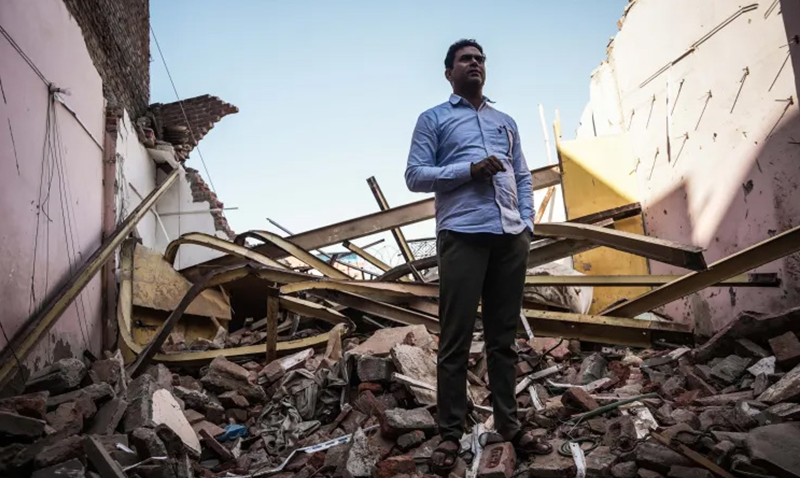Wakeel Hasan had to climb his Neighbour’s 1.8-metre (six-foot) wall to enter the rubble-filled plot of land where his house stood only a day earlier.
The police had barricaded the front of the land where his home, a single-floored, two-bedroom house that his family had called home for over a decade, was demolished on Wednesday by the authorities in Khajuri Khas, a densely populated neighbourhood in India’s capital, New Delhi.
A day later, he stood on the rubble of his house, tears rolling down his face as he overturned bricks and wood planks to try and recover his 15-year-old daughter Aliza’s textbooks, who had to miss her 10th standard annual examination on Thursday.
“I can’t even look at this demolished home and not cry,” Hasan told Al Jazeera. Only three months ago, Hasan was a national hero and had made headlines for rescuing 41 construction workers trapped in a Himalayan tunnel for more than two weeks.
His team of so-called “rat-hole miners” was called to the northern Uttarakhand state after professional rescuers armed with tunnel drilling machines repeatedly failed to reach the trapped workers. A nation of 1.5 billion people held its collective breath as the rat-hole miners dug by hand for 26 hours to free the buried men in November.
Hasan and his team received national recognition for their feat, including praise from Prime Minister Narendra Modi and a selfie with Bollywood superstar Shah Rukh Khan. Cash awards were announced and TV channels interviewed Hasan and his team of rat miners for days.
Only three months later, Hasan’s life turned upside down when he got a frantic call from his daughter while at a shop buying groceries.
Dragged out of the house’
Aliza said police officers had arrived at their house to demolish it and that she, along with her older brother Azeem, was standing against the door to prevent the police from entering. It was about 9:30 in the morning.
Soon, half a dozen police officers, some of them female, barged into the house and allegedly hit Aliza and Azeem, the assault caught on camera by people in a crowd that had gathered by now.
“I was slapped by the female police personnel and Azeem was pushed around, slapped and verbally abused. We were then dragged out of the house and thrown into a police car,” Aliza told Al Jazeera.
When Hasan reached home, he saw officials from the Delhi Development Authority (DDA), the government organisation in charge of planning and development of infrastructure projects in the capital, attempting to demolish his house with large hammers.
Before Hasan could do or say anything, a bulldozer began tearing the structure down.
The DDA claimed Hasan’s house was built illegally on government land. In a statement, it said Hassan’s family was informedbeforeo the demolition and that they were given enough time to evacuate.
Hasan says no prior notice was given and that he had the legal documents to prove it was his house, including an electricity bill issued by the government.
“They claim the act was part of a demolition drive of illegal properties, yet they only demolished one property: mine,” he told Al Jazeera.
The DDA and the police in New Delhi are controlled by Modi’s central government, even though an opposition party governs the capital.
When the DDA was asked about the action, it said it was routine, non-discriminatory and targeted no particular individual. Because I’m from a minority community?’
However, Hasan has a different story to tell. “I told them what I did in Uttarakhand. When all their machines had failed, we dug those workers out. I hoped they would consider not demolishing my house,” he said.
The opposite happened.
“When I told them my name it felt as if what little remorse and pity they had left them,” he said. “I don’t understand why I was targeted. Was it because I am from a minority community?”
Labour rights activist Sucheta De says the demolition was both illegal and criminal. “If we see the past instances of demolitions, it looks targeted, anti-poor and anti-minority,” she told Al Jazeera.
Lawyer Kawalpreet Kaur, who often takes up demolition cases and is closely following Hasan’s, suggested that if indeed Hasan’s property was illegal for so many years, it was the government that needed to answer questions.
“He had been staying in his house for over a decade. The question arises: if the government claims it was their land, what had they been doing for so many years?” she asked, adding that the demolition appeared to be “vindictive” as only Hasan’s house was demolished in the neighbourhood.



